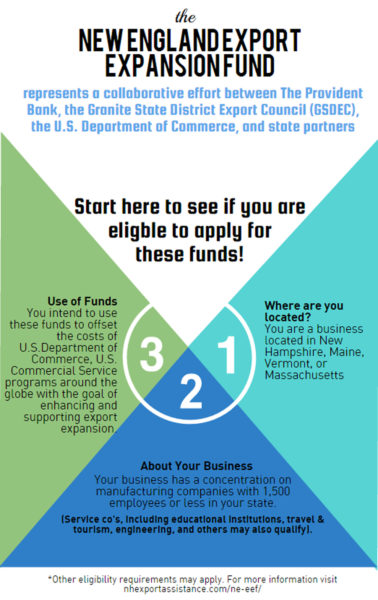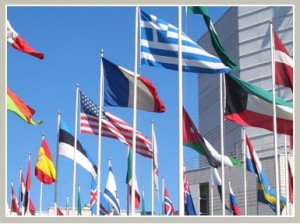Posts Tagged ‘U.S. Department of Commerce’
Monday, January 9th, 2017
A program developed three years ago to provide financial assistance to New Hampshire businesses exploring global markets is now open to potential exporters around the region.
 Courtesy US Commercial Service Due to its success, the New Hampshire Export Expansion Fund (EEF) is now the New England Export Expansion Fund covering New Hampshire, Massachusetts, Maine and Vermont. Through a partnership with The Provident Bank, the Granite State District Export Council, the U.S. Department of Commerce, and partners throughout New England, businesses across the region will now have the opportunity to receive financial assistance to expand sales to global markets.
The New Hampshire Office of International Commerce continues to be a key partner and driver of this export promotion grant program.
If the EEF program sounds familiar then that’s because it’s been around since 2014 assisting companies with international growth.
“Since its inception, New Hampshire companies have used the EEF over 60 times to support their international business development activities in over 20 markets,” said Tina Kasim, program manager of the New Hampshire Office of International Commerce. “We’re excited to see its continued growth through the partnership of The Provident Bank and we look forward to continuing our work with New Hampshire’s exporters to grow their international presence.”
Qualifying businesses can use EFF funds, via indirect grants, to take advantage of the many services provided by the U.S. Department of Commerce, U.S. Commercial Service. With these programs, businesses looking to expand their market reach overseas can use the funds to cover costs of due diligence on and even meeting with identified partners.
The EEF program is open to qualifying New Hampshire companies with 1,500 employees or less in their state’s location. Although the program aims to concentrate on manufacturing companies, services companies, including educational institutions, travel and tourism, engineering and other service companies, may also qualify.
With the New England Export Expansion Fund, the world is open for business. If your company is looking to expand internationally, we encourage you to contact OIC at 603.271.8444 or the New Hampshire Export Assistance Center/U.S. Commercial Service at 603.610.2417.

Nathaniel Nelson
International Trade Officer
Office of International Commerce
Tags: New England Export Expansion Fund, Office of International Commerce, Provident Bank, U.S. Commercial Service, U.S. Department of Commerce
Posted in NH Business Matters | Comments Off on NE Export Expansion Fund Opens the World for Your Small Business
Thursday, February 27th, 2014
New Hampshire led a national surge in export growth in 2013, according to the International Trade Administration, increasing its merchandise exports by more than 22 percent, to $4.3 billion.
Nationally, the US set an all-time record for the export of goods and services, reaching $2.3 trillion.
“We can attribute our growth to several factors, not the least of which is the savvy and innovative nature of our companies – their products are in demand around the globe,” said Tina Kasim, program manager for the International Trade Resource Center. “The other important factor is the strong partnership we have with the US Department of Commerce here in New Hampshire.”
The two agencies work closely with companies and manufacturers to connect them with trade opportunities.
“These numbers show that New Hampshire exporters continue to take advantage of international growth opportunities to diversify their market portfolios and grow their businesses,” said Justin Oslowski, director of US Commercial Service in Durham.
In the second year of funding of the State Trade Export Promotion program, New Hampshire used its nearly $300,000 award last year to provide matching grants to companies that enabled them to receive services about international markets.
New Hampshire’s merchandise export sales in 2013 outpaced the 2012 figures in many top destinations, including: the Czech Republic (+236 percent); Saudi Arabia (+196 percent); the United Arab Emirates (+161 percent); Colombia (+130 percent) and Canada (+109 percent). Key merchandise export categories include: Computer and electronic products; oil and gas; machinery manufactures; fabricated metal products and electrical equipment.
According to the ITA, the state’s largest market last year was Canada, posting merchandise exports of $1.4 billion, representing 31.7 percent of the state’s total merchandise exports. Following Canada was Mexico ($409 million); China ($266 million); Germany ($212 million) and the Netherlands ($177 million).
In 2012 (the latest figures available), the Manchester-Nashua metropolitan region recorded $1.6 billion in exports.
For more information about export, contact Kasim at the ITRC at 603-271-8444 or www.ExportNH.org or Oslowski at US Commercial Service at 603-953-0212.
Tags: New Hampshire Department of Resources & Economic Development, New Hampshire Division of Economic Development, New Hampshire exports, New Hampshire International Trade Resource Center, U.S. Department of Commerce
Posted in NH Business Matters | Comments Off on New Hampshire Export Growth Led Nation in 2013
Monday, February 13th, 2012
If you are want to safeguard your investments, you are probably going to diversify your portfolio. Having a variety of investments will not only help protect you when certain markets are down, but should also help you grow your investments. The same can be said about your business. There are a number of ways a business can diversify its portfolio: by size and number of clients; variety of revenue streams; and exporting your products, the subject of today’s column.
Exporting can be a great way to avoid having all of your eggs in one basket. When you diversify your markets, the result can be a more even business cycle. I can’t think of a business that wouldn’t mind avoiding the rollercoaster of activity that can come with a narrow business model. If you are new to exporting, there are some free and cost- effective resources to help you make the transition to international markets.
The Office of International Commerce (OIC) here at the New Hampshire Division of Economic Development has staff who work one-on-one with New Hampshire businesses interested in exporting their products. OIC regularly offers low-cost workshops on topics such as export documentation, environmental compliance, doing business in Russia and international traffic in arms regulation. OIC also offers free technical assistance in our office or at your place of business. More information on OIC’s programs and services can be found at www.exportnh.org. The staff will help research potential markets and guide you to other resources such as the U.S. Department of Commerce for more in-depth assistance.
I spoke with Justin Oslowski, the Director for the New Hampshire branch of the U.S. Commercial Service, a division of the Department of Commerce. Much like the OIC, the U.S. Commercial Service, www.export.gov/newhampshire, helps reduce the sometimes complicated and confusing processes that can come with exporting. Most of Justin’s clients export business-to-business and have some previous experience with exporting. His office also offers free general market research for businesses looking to export. A company must be selling a product that contains at least 51% American content to participate in their programs.
One of the great selling points for the U.S. Commercial Service is that their network is deep and wide with in-country representation in 80 countries around the world. Their staff can pick up the phone and obtain country-specific information and contacts. They offer a “Gold Key” service that for $700 connects a business with in-country representation, arranges 4-6 business matchmaking appointments, provides an in-country briefing and cam even assist with the travel arrangements. Justin said they don’t want to waste anyone’s time or money, so if a market doesn’t look feasible during the initial meeting, they don’t go forward. If the market does look like a good fit, the company can expect to have appointments set up in about 8-10 weeks from their start in the program.
Even with the free and low-cost export assistance available, a successful launch into exporting requires an investment of both time and money. Thanks to a U.S. SBA grant, New Hampshire was awarded nearly $300,000 in 2011 to assist with exporting. The State Trade Export Promotion (STEP) grant will be used over a three-year period to enhance OIC’s efforts to help small businesses in New Hampshire prepare for new markets, comply with regulations, access financing, and attend trade missions. Specialized programs will focus on foreign markets that have the highest growth potential and industries that have the greatest ability to compete successfully.
While we see a need to grow our presence internationally New Hampshire isn’t unknown outside of our borders. Our state exports in 2010 were 44% higher than those in 2009. We were the highest ranking state in New England and we were ranked in the top five for the country. While the number decreased in 2011, New Hampshire businesses continue to see the international market as a place to grow and diversify. Our products in a vast array of industries are sold to more than 160 different countries.
While some may think that it is tough to compete globally, American products are well received overseas as we have a reputation for high quality, innovative products. It may surprise some people to learn that our state’s number one country of export is Mexico, while China is ranked fifth. How about them apples?
Christine J. Davis works for the New Hampshire Division of Economic Development as a resource specialist serving businesses in Rockingham and Strafford counties. She connects businesses with the available resources so that they may remain viable and growing entities in the community. She can be reached at Christine.Davis@dred.state.nh.us.
Ms. Davis lives in Exeter with her two daughters. When not performing her work or parenting duties she can be found volunteering with her girls for the Chamber Children’s Fund, “hitting the gym,” or spending time with friends and family.
Tags: Christine Davis, Justin Oslowski, NH Office of International Trade, Tina Kasim, U.S. Department of Commerce
Posted in NH Business Matters | Comments Off on “Ask CJ” Growing Your Business-Exporting
Tuesday, September 27th, 2011
U.S. Senator Jeanne Shaheen (D-NH) announced today that New Hampshire will receive $299,493 to help more small businesses increase their exports by reaching new foreign markets. The funding comes from the Small Business Administration’s State Trade Export Promotion (STEP) grant program, which was created by the Small Business Jobs Act, legislation Shaheen helped craft as a member of the Senate Small Business Committee.
 “Exports represent a tremendous potential for growth for small businesses in the United States, and we need to do more to help them reach foreign markets, so that they can grow and create jobs,” Shaheen said. “This grant is well-tailored to New Hampshire’s economy because it will help more businesses reach two fast-growing markets, China and India, while also encouraging more export growth in aerospace and defense.” “Exports represent a tremendous potential for growth for small businesses in the United States, and we need to do more to help them reach foreign markets, so that they can grow and create jobs,” Shaheen said. “This grant is well-tailored to New Hampshire’s economy because it will help more businesses reach two fast-growing markets, China and India, while also encouraging more export growth in aerospace and defense.”
The STEP grant will enhance the state’s International Trade Resource Center (ITRC) efforts to help small businesses in New Hampshire prepare for new markets, comply with trade regulations, access export financing, and attend trade missions. With this grant, the ITRC will create specialized programs to focus on foreign markets that have the highest growth potential and industries that have the greatest and most immediate ability to compete successfully in the world marketplace.
“We are thrilled that the New Hampshire business community will be able to benefit from this grant which is dedicated to helping local companies maximize their opportunities abroad,” said New Hampshire Department of Resources & Economic Development Commissioner George Bald. “At a time when demands for exports are at an all-time high for our small and medium-sized entrepreneurs, this grant will allow us to provide assistance in key areas of need. We commend Senator Shaheen, Governor Lynch and all of our partners including the New Hampshire offices of the Small Business Administration, the U.S. Department of Commerce for their commitment to helping New Hampshire businesses gain access to the international marketplace.”
“The SBA is thrilled to support the State of New Hampshire’s already successful export efforts,” said Jeanne A. Hulit, regional administrator of the SBA. “The President has set a goal of doubling U.S. exports over the next five years. New Hampshire is already leading the country with the highest percentage growth in exports in 2010. This grant will further help New Hampshire’s small businesses export their products and services, creating new jobs. We commend Senator Shaheen for her support for including the STEP grants as a key part of the Jobs Act.”
The STEP program was designed to support the efforts of state and local export assistance programs. These programs help small businesses overcome obstacles that stand in the way of accessing foreign markets, such as a lack of expertise or resources. At a recent Small Business Committee field hearing on small business exporting, Shaheen heard from several small businesses that have relied on the expertise and assistance of the ITRC to grow their businesses through exporting. The program was originally conceived of in the Small Business Export Enhancement and International Trade Act of 2009 (S.2862), which Shaheen supported and which was later folded into the Small Business Jobs Act.
A member of the Senate Committee on Small Business, Shaheen has consistently worked to aid small companies in reaching foreign customers. In August, she hosted a Small Business Committee field hearing in Manchester with U.S. Senator Kelly Ayotte (R-NH) to examine ways to help small businesses export. In January, Shaheen held a pair of roundtable discussions with New Hampshire small business owners on the federal resources available to help small businesses export with Export-Import Bank Chairman and President Fred Hochberg.
In New Hampshire, exporting has become an increasingly important part of the state’s economy. Last year, New Hampshire companies set a state record for international sales and ranked first among all states in export growth, increasing their exports by $1 billion. In a difficult economic climate, this new revenue has provided a critical boost to many New Hampshire businesses.
Tags: Export-Import Bank, Fred Hochberg, International Trade Resource Center, Jeanne Hulit, Jeanne Shaheen, Kelly Ayotte, New Hampshire Department of Resources & Economic Development, Small Business Administration, Small Business Jobs Act, STEP grant, U.S. Department of Commerce
Posted in NH Business Matters | Comments Off on Shaheen Announces Grant to Help Small Businesses Increase Exports
Friday, February 11th, 2011
Lenders who participate in the U.S. Small Business Administration’s Preferred Lender Program can approve loans through the agency’s new Small Loan Advantage program beginning Feb. 15. At the same time, the agency will begin accepting applications from community-based, mission-focused lenders who are interested in making SBA-guaranteed loans through the new Community Advantage program.
 Both the Small Loan Advantage and Community Advantage programs were announced in December as part of the agency’s efforts to increase the number of lower dollar loans being made to small businesses and entrepreneurs in underserved communities. Both the Small Loan Advantage and Community Advantage programs were announced in December as part of the agency’s efforts to increase the number of lower dollar loans being made to small businesses and entrepreneurs in underserved communities.
“Businesses in underserved communities, including minority and women-owned as well as businesses in rural areas, have been among the hardest hit by the recent economic downturn,” said SBA Administrator Karen Mills. “These two new Advantage initiatives can provide critical support to help these businesses and entrepreneurs get much needed financing to start and grow, which will translate into more jobs in these communities.”
Built on what the agency refers to as its “Advantage” platform, both Small Loan Advantage and Community Advantage offer a streamlined application process for SBA-guaranteed 7(a) loans up to $250,000. Advantage loans will come with the regular 7(a) government guarantee, 85 percent for loans up to $150,000 and 75 percent for those greater than $150,000.
Starting Feb. 15, any of the 610 financial institutions across the country in the SBA’s Preferred Lender Program (PLP) can approve loans using the new Small Loan Advantage process. Under PLP, which includes most of the agency’s highest volume lenders, SBA delegates the final credit decisions to these lenders.
Additionally, on Feb. 15, SBA will begin accepting applications from financial institutions who are interested in becoming Community Advantage lenders. Through Community Advantage, the agency will expand the points of access small business owners have for getting loans by opening SBA’s 7(a) loan program to “mission-focused” financial institutions, including Community Development Financial Institutions, SBA’s Certified Development Companies and SBA’s nonprofit microlending intermediaries. Community Advantage will leverage the experience these institutions already have in lending to minority, women-owned and start-up companies in economically challenged markets, along with their management and technical assistance expertise, to help make their borrowers successful.
SBA and U.S. Department of Commerce studies have shown the importance of lower-dollar loans to small business formation and growth in underserved communities. With that in mind, the two new loan initiatives – Small Loan Advantage and Community Advantage – are aimed at increasing the number of lower-dollar SBA 7(a) loans going to small businesses and entrepreneurs in underserved communities. The agency’s most popular loan product, 7(a) government-guaranteed loans can be used for a variety of general business purposes, including working capital and purchases of equipment and real estate.
Community-based organizations interested in becoming Community Advantage lenders should contact the closest SBA district office.
Tags: Community Advantage program, Karen Mills, Preferred Lender Program, Small Loan Advantage program, U.S. Department of Commerce, U.S. Small Business Administration
Posted in NH Business Matters | Comments Off on SBA Lending Initiatives for Underserved Communities Launch on Feb. 15
Tuesday, November 16th, 2010
In his recent trip to India, President Obama cited Hollis-based Skelley Medical as one of a small number of companies including GE and Boeing, as part of the New Export Initiative. The New Export Initiative will create over 50,000+ jobs here in the US from selling goods and services in India.
 Over the past year, Skelley Medical has dramatically increased its sales of certified pre‐owned medical equipment to India as a direct result of the trade mission it went on with the U.S. Department of Commerce this year. Over the past year, Skelley Medical has dramatically increased its sales of certified pre‐owned medical equipment to India as a direct result of the trade mission it went on with the U.S. Department of Commerce this year.
“We are very gratified to be mentioned by President Obama in his speech. Improving patient care and reducing the cost of health care is a global challenge and our team is working hard to make a contribution,” company President Bill Skelley said. “The recent recession forced us to think differently and develop a successful business model of acquiring surplus equipment from U.S. hospitals and exporting the equipment worldwide, primarily to India.”.
In addition to providing surplus equipment, Skelley Medical also repairs equipment and recently opened a repair shop in Mumbai, India to service Indian based hospitals. With the tightening capital budgets in U.S. hospitals; Skelley has actually helped hospitals increase capital by buying their used equipment.
“As a small business, our success is imperative on building relationships with companies inside the United States and abroad to find new and cost effective solutions for our customers,” Skelley added.
Tags: Bill Skelley, New Export Initiative, President Obama, Skelley Medical, U.S. Department of Commerce
Posted in NH Business Matters | Comments Off on Skelley Medical Cited for Participation in New Export Initiative
Monday, October 11th, 2010
Wow – check out this great five year executive summary which details the impact of the New Hampshire Manufacturing Extension Partnership on job creation and the economy. Great job MEP!!
The Economic Impacts of the
New Hampshire Manufacturing Extension Partnership Program
on the New Hampshire Economy
Five Year Executive Summary
The New Hampshire Manufacturing Extension Partnership (MEP) program is supported by the National Institute of Standards and Technology within the U.S. Dept. of Commerce to help small- and medium-size manufacturers identify and implement advanced manufacturing and management technologies. Through a network of resources, the MEP links client firms with local and national sources of expertise to address specific problems. This study estimates the total economic contribution to the New Hampshire economy from firms whose employment, sales, or investment activity changed as a direct result of assistance provided by the New Hampshire MEP.
 New Hampshire MEP clients are surveyed, by an independent third party survey company, to determine the economic impact resulting from their relationship with the MEP program. Clients are surveyed roughly one year after the completion of a project and asked a number of questions relating to changes in efficiency and output as well as questions relating to the quality of the MEP services they received. Between October 2005 and August 2010 189 companies surveyed reported that, as a result of their relationship with the New Hampshire MEP they have: ¹ New Hampshire MEP clients are surveyed, by an independent third party survey company, to determine the economic impact resulting from their relationship with the MEP program. Clients are surveyed roughly one year after the completion of a project and asked a number of questions relating to changes in efficiency and output as well as questions relating to the quality of the MEP services they received. Between October 2005 and August 2010 189 companies surveyed reported that, as a result of their relationship with the New Hampshire MEP they have: ¹
· Created 344 jobs that otherwise would not exist
· Retained 661 jobs that otherwise would not exist
· Increased and retained $206.2 million in sales
· Spent $78 million on new investment
· Experienced $28.7 million in cost savings
The effects of this increased economic activity, extends beyond the client firms. Increased sales by New Hampshire MEP client firms require that they increase their purchases of intermediate goods and services from companies located in New Hampshire and elsewhere to support their increased output. The supplying companies, in turn, generate additional demands of their own. In this way, dollar expenditures for final demand can be traced to all of the affected industries in the regional economy. In addition, the income from new jobs generated by New Hampshire MEP clients and the supplying firm’s results in increased demand for consumer goods. Each of these effects, in turn, generates subsequent ripples throughout the New Hampshire economy. The sum of these direct, indirect, and induced effects suggests that small- and medium-size manufacturing companies that increased or retained jobs or sales and/or increased investments with assistance from the New Hampshire MEP are responsible for:¹
· Creating or retaining 3295 jobs that paid a total of $159.6 million in employee wages and benefits
· Increasing or retaining economic output worth $600.6 million
· Contributing or retaining $261.8 million of gross state product
· Generating or retaining $87.2 million in additional tax and non-tax revenues at the
Federal, state, and local government levels, including $18.3 million at the state and local level
Tags: National Institute of Standards and Technology, New Hampshire Manufacturing Extension Partnership, U.S. Department of Commerce
Posted in NH Business Matters | Comments Off on The Vast Impact of NH Manufacturing Extension Partnership
Friday, February 12th, 2010
A “who’s who” of U.S. export controls agencies will be traveling to Portsmouth to speak at a three-day seminar on U.S. export controls from April 20-22 at the Sheraton Portsmouth Harborside Hotel. Licensing officers from the Bureau of Industry and Security (BIS), as well as the Directorate of Defense Trade Controls (DDTC), will be on hand over the three days to present up-to-date information on current export controls regulations and answer questions on companies’ export control concerns and issues.
 Presented by the New Hampshire International Trade Resource Center (NHITRC) in coordination with the U.S. Department of Commerce’s BIS and U.S. Department of State’s DDTC, the first two days will consist of a “Complying With U.S. Export Controls” overview that will cover Export Administration Regulations (EAR) and how they impact exporters as well as compliance with U.S. export control requirements on commercial goods. The third day will consist of a one-day seminar for companies producing or selling defense articles that will help clarify what the International Traffic in Arms Regulations (ITAR) governs, what the U.S. Munitions List (USML) is, what it means to a company if a product is ITAR-classified and how to complete a license application or a Commodity Jurisdiction request (CJ). Presented by the New Hampshire International Trade Resource Center (NHITRC) in coordination with the U.S. Department of Commerce’s BIS and U.S. Department of State’s DDTC, the first two days will consist of a “Complying With U.S. Export Controls” overview that will cover Export Administration Regulations (EAR) and how they impact exporters as well as compliance with U.S. export control requirements on commercial goods. The third day will consist of a one-day seminar for companies producing or selling defense articles that will help clarify what the International Traffic in Arms Regulations (ITAR) governs, what the U.S. Munitions List (USML) is, what it means to a company if a product is ITAR-classified and how to complete a license application or a Commodity Jurisdiction request (CJ).
This event will be the only one in the New England area this year with BIS and DDTC officials presenting. Don’t miss out!
Participants are invited to attend the two-day BIS seminar, the one-day DDTC seminar, or the full three-day event. Please visit http://www.buyusa.gov/newhampshire/bis.html for more information, or www.exportnh.org/calendar/registration.aspx to register. For questions, contact Katy Reno at (603) 271-8444 or katy.reno@dred.state.nh.us, or Justin Oslowski at (603) 953-0210 or Justin.Oslowski@mail.doc.gov.
Administered by the New Hampshire Division of Economic Development’s Office of International Commerce, the ITRC plans, develops and administers programs for international trade promotion and foreign market development. For more information about the ITRC, call (603) 271-8444, or visit their website at www.exportnh.org
Tags: Bureau of Industry and Security, Directorate of Defense Trade Controls, Justin Oslowski, Katy Reno, New Hampshire International Trade Resource Center, Sheraton Portsmouth Harborside Hotel, U.S. Department of Commerce
Posted in NH Business Matters | Comments Off on Export Controls Officials from U.S. Government Speak at Seminar in Portsmouth
Thursday, January 28th, 2010
The U.S. Department of Commerce has awarded the University of New Hampshire’s Geographically Referenced Analysis and Information Transfer (NH GRANIT) project approximately $1.7 million to manage a program that will inventory and map current and planned broadband coverage available to the state’s businesses, educators, and citizens.
 The New Hampshire Broadband Mapping Program (NHBMP) is a coordinated, multi-agency initiative funded by the American Recovery and Reinvestment Act through the National Telecommunications and Information Administration (NTIA), and is part of a national effort to expand high-speed Internet access and adoption through improved data collection and broadband planning. The New Hampshire Broadband Mapping Program (NHBMP) is a coordinated, multi-agency initiative funded by the American Recovery and Reinvestment Act through the National Telecommunications and Information Administration (NTIA), and is part of a national effort to expand high-speed Internet access and adoption through improved data collection and broadband planning.
GRANIT, which is housed at the UNH Institute for the Study of Earth, Oceans, and Space (EOS), serves as the statewide geographic information system (GIS) clearinghouse.
“The results of the mapping activity will be an important determinant in future broadband access across the state, which is important for all citizens in terms of economic development, education, health care, public health and safety, and quality of life issues,” says GRANIT director Fay Rubin of the Complex Systems Research Center at EOS.
The state’s nine regional planning commissions will collaborate with GRANIT on data collection and verification activities, as well as conduct regional broadband planning activities. Additional support will be provided by a variety of state agencies, including the Division of Economic Development, the Office of Energy and Planning, and the Public Utilities Commission.
 Carol Miller “We are pleased to set this project in motion. It’s a great example of how collaboration between public and private agencies works for the betterment of all,” says Carol Miller, director of broadband technology at the New Hampshire Division of Economic Development. She adds, “In addition, we will be providing information that will help to develop and track the national broadband plan.”
The Southwest Region Planning Commission (SWRPC) based in Keene is taking the lead role among the regional planning commissions for the project. “This initiative comes at a time of challenge and represents a significant opportunity to address the infrastructure needs of our communities and our state so vital in maintaining a vibrant economy,” says Tim Murphy, executive director of SWRPC.
The project is comprised of two components: a two-year broadband availability inventory and mapping effort, and a four-year planning initiative.
The inventory will use service-area data collected from the 60-plus public and commercial entities, both landline and wireless, that provide broadband services in the state. These data, describing service availability, type, and technology, will help to identify areas of the state that are unserved or underserved by the current broadband infrastructure. Data will also be collected on broadband availability at individual community anchor institutions, including schools, libraries, medical/healthcare locations, public safety offices, and state, county, and municipal buildings.
The planning component of the NHBMP will incorporate the information collected and the momentum generated by the mapping activities into regional broadband plans throughout New Hampshire. It will involve establishing regional broadband stakeholder groups to identify barriers to broadband deployment, promote collaboration with service providers, facilitate information sharing regarding the use of and demand for broadband services, and develop broadband plans for each region of the state.
NTIA has now awarded 41 grants to states and U.S. territories totaling approximately $78 million under the program. In addition to NH, the most recent round of awards went to Iowa, Montana, Utah, and the U.S. Virgin Islands. The agency expects to finish announcing awards under the program in early 2010.
The data collected and compiled under the national program will be used to develop publicly available state-wide broadband maps and to inform the comprehensive, interactive, and searchable national broadband map that NTIA is required by the Recovery Act to create and make publicly available by February 17, 2011.
According to Rubin, the NHBMP is scheduled to deliver a preliminary assessment of areas of the state that are unserved or underserved by broadband to NTIA by this spring.
“We will be contacting agencies, organizations, businesses, and residents in the state and we hope that there will be a high degree of interest in and support for this effort. Collecting accurate and comprehensive data will be critical for the project’s success,” Rubin says.
The University of New Hampshire, founded in 1866, is a world-class public research university with the feel of a New England liberal arts college. A land, sea, and space-grant university, UNH is the state’s flagship public institution, enrolling 12,200 undergraduate and 2,200 graduate students.
Tags: Carol Miller, Fay Rubin, National Telecommunications and Information Administration, New Hampshire Broadband Mapping Program, NH GRANIT, Office of Energy and Planning, Public Utilities Commission, Southwest Region Planning Commission, Tim Murphy, U.S. Department of Commerce, UNH Institute for the Study of Earth Oceans and Space, University of New Hampshire
Posted in NH Business Matters | Comments Off on UNH Awarded $1.7M For Broadband Internet Mapping Project
Wednesday, October 28th, 2009
Companies exporting electrical or soldered products into the European Union are invited to attend an “Understanding European Union Environmental Directives” workshop at the New Hampshire Division of Economic Development (172 Pembroke Road) on Thursday, November 5th from 9 a.m.-noon.
 Presented by the New Hampshire International Trade Resource Center, this seminar will feature Bob Straetz, Office of the European Union, U.S. Department of Commerce and will provide an overview of recent changes to environmental regulations and information requirements for exporters to the EU. Presented by the New Hampshire International Trade Resource Center, this seminar will feature Bob Straetz, Office of the European Union, U.S. Department of Commerce and will provide an overview of recent changes to environmental regulations and information requirements for exporters to the EU.
This half-day introductory seminar will also address the following: EuP (EcoDesign Requirements for Energy Using Products), RoHS (Restriction of Hazardous Substances), WEEE (Waste Electronic and Electrical Equipment) and CE Mark.
The cost of the program is $40 per person. To register, please contact Katy Reno at (603) 271-8444 or katy.reno@dred.state.nh.us.
Tags: Bob Straetz, European Union, International Trade Resource Center, Katy Reno, New Hampshire Division of Economic Development, U.S. Department of Commerce
Posted in NH Business Matters | Comments Off on European Union Environmental Directives Seminar Scheduled
|












 “Exports represent a tremendous potential for growth for small businesses in the United States, and we need to do more to help them reach foreign markets, so that they can grow and create jobs,” Shaheen said. “This grant is well-tailored to New Hampshire’s economy because it will help more businesses reach two fast-growing markets, China and India, while also encouraging more export growth in aerospace and defense.”
“Exports represent a tremendous potential for growth for small businesses in the United States, and we need to do more to help them reach foreign markets, so that they can grow and create jobs,” Shaheen said. “This grant is well-tailored to New Hampshire’s economy because it will help more businesses reach two fast-growing markets, China and India, while also encouraging more export growth in aerospace and defense.” Both the Small Loan Advantage and Community Advantage programs were announced in December as part of the agency’s efforts to increase the number of lower dollar loans being made to small businesses and entrepreneurs in underserved communities.
Both the Small Loan Advantage and Community Advantage programs were announced in December as part of the agency’s efforts to increase the number of lower dollar loans being made to small businesses and entrepreneurs in underserved communities.  Over the past year, Skelley Medical has dramatically increased its sales of certified pre‐owned medical equipment to India as a direct result of the trade mission it went on with the U.S. Department of Commerce this year.
Over the past year, Skelley Medical has dramatically increased its sales of certified pre‐owned medical equipment to India as a direct result of the trade mission it went on with the U.S. Department of Commerce this year. New Hampshire MEP clients are surveyed, by an independent third party survey company, to determine the economic impact resulting from their relationship with the MEP program. Clients are surveyed roughly one year after the completion of a project and asked a number of questions relating to changes in efficiency and output as well as questions relating to the quality of the MEP services they received. Between October 2005 and August 2010 189 companies surveyed reported that, as a result of their relationship with the New Hampshire MEP they have: ¹
New Hampshire MEP clients are surveyed, by an independent third party survey company, to determine the economic impact resulting from their relationship with the MEP program. Clients are surveyed roughly one year after the completion of a project and asked a number of questions relating to changes in efficiency and output as well as questions relating to the quality of the MEP services they received. Between October 2005 and August 2010 189 companies surveyed reported that, as a result of their relationship with the New Hampshire MEP they have: ¹ Presented by the New Hampshire International Trade Resource Center (NHITRC) in coordination with the U.S. Department of Commerce’s BIS and U.S. Department of State’s DDTC, the first two days will consist of a “Complying With U.S. Export Controls” overview that will cover Export Administration Regulations (EAR) and how they impact exporters as well as compliance with U.S. export control requirements on commercial goods. The third day will consist of a one-day seminar for companies producing or selling defense articles that will help clarify what the International Traffic in Arms Regulations (ITAR) governs, what the U.S. Munitions List (USML) is, what it means to a company if a product is ITAR-classified and how to complete a license application or a Commodity Jurisdiction request (CJ).
Presented by the New Hampshire International Trade Resource Center (NHITRC) in coordination with the U.S. Department of Commerce’s BIS and U.S. Department of State’s DDTC, the first two days will consist of a “Complying With U.S. Export Controls” overview that will cover Export Administration Regulations (EAR) and how they impact exporters as well as compliance with U.S. export control requirements on commercial goods. The third day will consist of a one-day seminar for companies producing or selling defense articles that will help clarify what the International Traffic in Arms Regulations (ITAR) governs, what the U.S. Munitions List (USML) is, what it means to a company if a product is ITAR-classified and how to complete a license application or a Commodity Jurisdiction request (CJ). The New Hampshire Broadband Mapping Program (NHBMP) is a coordinated, multi-agency initiative funded by the American Recovery and Reinvestment Act through the National Telecommunications and Information Administration (NTIA), and is part of a national effort to expand high-speed Internet access and adoption through improved data collection and broadband planning.
The New Hampshire Broadband Mapping Program (NHBMP) is a coordinated, multi-agency initiative funded by the American Recovery and Reinvestment Act through the National Telecommunications and Information Administration (NTIA), and is part of a national effort to expand high-speed Internet access and adoption through improved data collection and broadband planning.
 Presented by the New Hampshire International Trade Resource Center, this seminar will feature Bob Straetz, Office of the European Union, U.S. Department of Commerce and will provide an overview of recent changes to environmental regulations and information requirements for exporters to the EU.
Presented by the New Hampshire International Trade Resource Center, this seminar will feature Bob Straetz, Office of the European Union, U.S. Department of Commerce and will provide an overview of recent changes to environmental regulations and information requirements for exporters to the EU.